With many trending colours getting toastier, it may come as little surprise that today’s popular blue tones are warming up, too. What may be surprising to some though is just how versatile these warmer blues are to work with. These hues can be anything you want them to be - exciting and decadent or restful and easy to live with - depending on which on-trend Resene shade of blue you choose and what you pair it with.
There are two important factors to consider when it comes to choosing just the right blue for your home. Firstly, you will need to examine the amount of light in your space, especially when it comes to how much direct sunlight the room receives. For rooms with little or no sunlight, opt for deep warm blues with red undertones such as Resene Cobalt, Resene Biscay or Resene Madison.
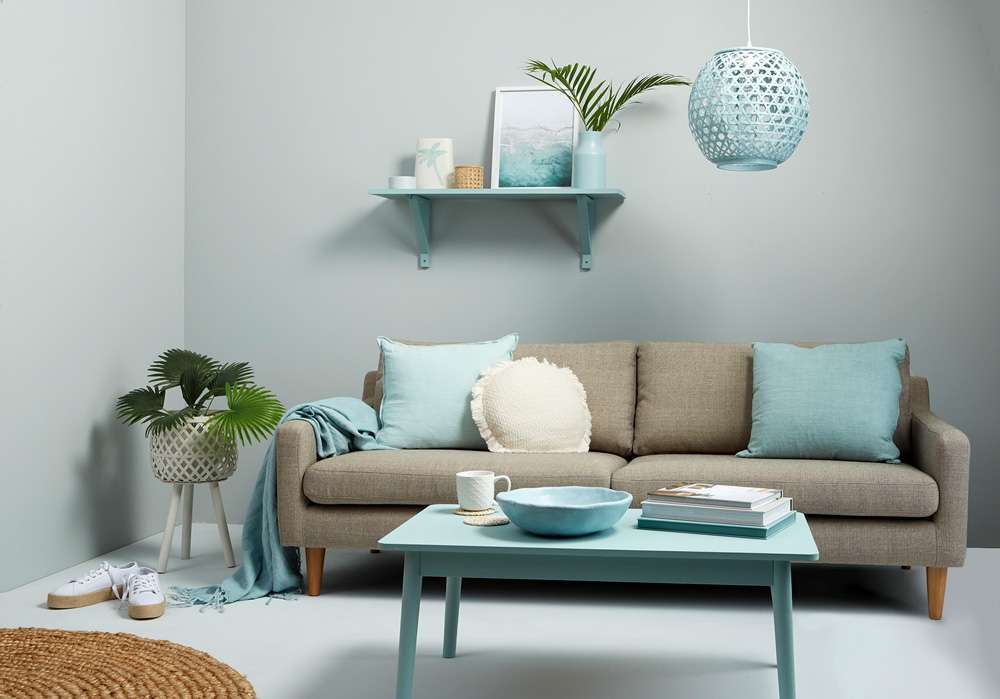
Dusty blues like Resene Duck Egg Blue on these living room walls, are not only on-trend but are incredibly easy to live with. Floor in Resene Quarter Duck Egg Blue, coffee table and shelf in Resene Rewind, pendant lamp, tall vase and bowl in Resene Raindance, woven plant stand in Resene Quarter Tea, palm tree vase in Resene Quarter Tea and Resene Raindance and tea light holder in Resene Slipstream. Project by Vanessa Nouwens, image by Bryce Carleton.
Start your property search
The other important factor is the type of room you’re painting. Is it a transitional space like a hallway, laundry or a spare room? Or is it a living space, bedroom or office that you will be spending lots of time in?
“For transitional spaces, the blue you choose can be sharper and stronger than what you would use in a high-use area such as a kitchen or living room,” explains interior designer Megan Harrison-Turner.
It is also important to note that even a little blue pigment can go a long way, so don’t just look at strictly shades of blue alone. In some spaces, greys with blue undertones like Resene Longitude, Resene Half Gull Grey, Resene Freestyling and Resene Neutral Bay will read as blue once painted on the walls. “A grey paint with blue pigment or ‘undertone’ can make a great base for a subtle and elegant colour scheme,” says Resene Colour Expert Brenda Ngatai.
If you are wanting to create a smart and sophisticated interior, navy and teal blues such as Resene Coast, Resene Tarawera and Resene Cello are all warmer ways of embracing the current dark hue trend. They also bring a luxurious feel – and for good reason. “Historically, navy blue was among the most expensive colours to produce and spoke of the wealth and extravagance of the homes it appeared in,” explains Brenda.
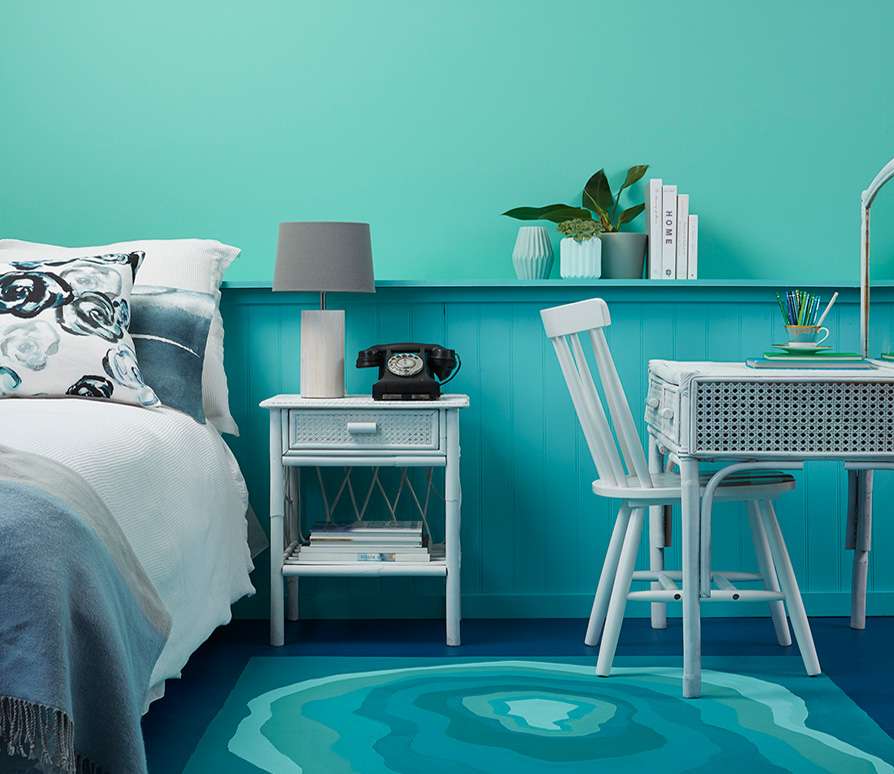
For true blue fans, going all out with aqua in a bach bedroom is an epic idea for creating an ocean-inspired oasis. Wall in Resene Freelance with tongue-and-groove in Resene Yes Please, floor in Resene Wishing Well with painted rug feature in Resene Deep Teal, Resene Maestro, Resene Hullabaloo, Resene Blue Chill, Resene Yes Please and Resene Freelance, desk, bedside table and chair in Resene Poured Milk, wooden Lamp Base in Resene Colorwood Whitewash, short vase in Resene Kandinsky and small plant pot in Resene Meditation. Project by Megan Harrison-Turner, image by Bryce Carleton.
Painting your walls in the deeper inky tones of Resene Indian Ink, Resene Tangaroa or Resene Avalanche is a bold but wonderful way to build a look that feels cosy and cocooning thanks to their subtle warm notes. These mature shades are ideal for intimate living spaces or master bedrooms; however, balance is key in avoiding the space feeling sombre. Megan recommends keeping ceilings, trims and window frames light, but suggests using warmer off-whites such as Resene Rice Cake, Resene Half Villa White or neutral white Resene Sea Fog as they will lend a better overall finished look.
“When it comes to styling inky walls, introducing warm metallics like gold or brass and mirrors or mirror-finish furniture will help create a more refined ambience in a dark painted room, since all will help reflect more light back into the room,” explains Megan.
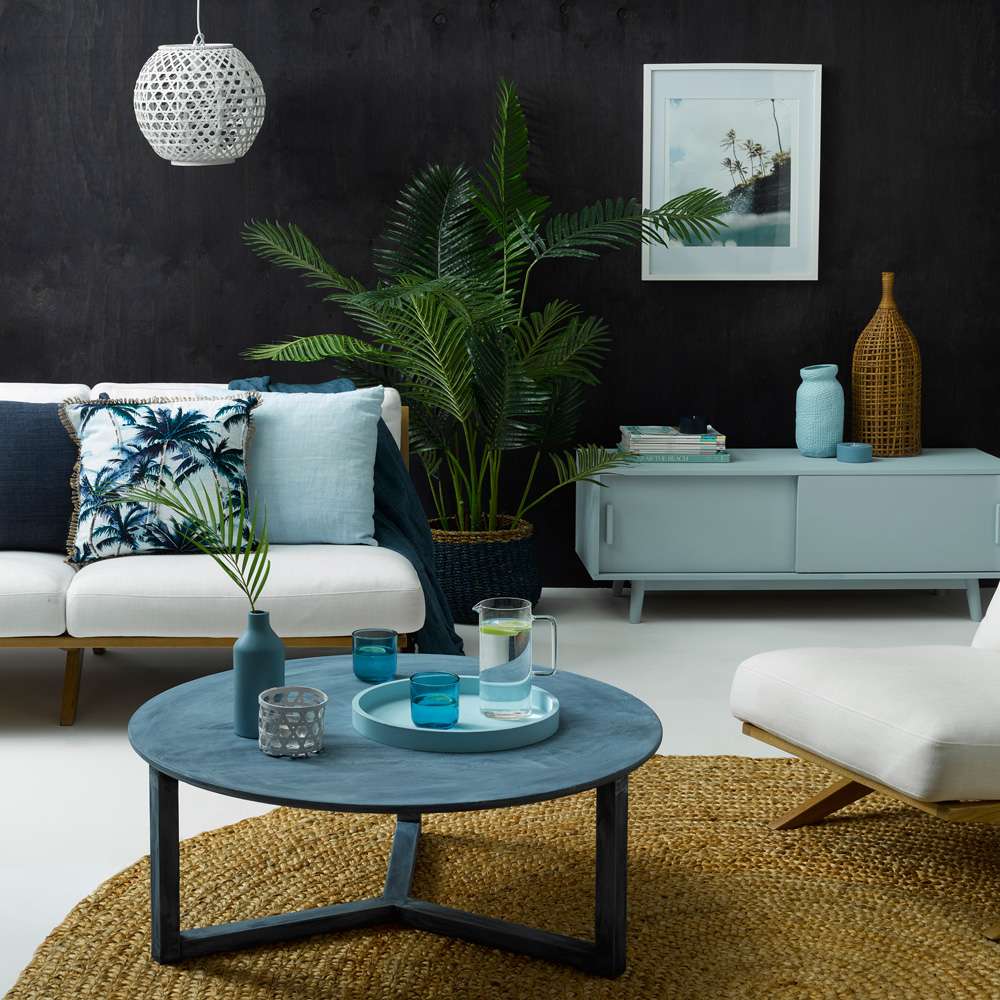
Not all blues have to be opaque. If you have plywood walls, try staining them in Resene Woodsman Woody Bay, which will allow the natural beauty of the wood grain to show through. Floor and pendant lamp painted in Resene Sea Fog, sideboard in Resene Casper, coffee table in Resene Indian Ink with Resene Sea Fog wiped on as a ‘whitewash’, tray in ReseneEscape, vase (with palm leaf) and tea light holder in Resene Lazy River, white rattan votive holder in Resene Sea Fog and textured vase in Resene Escape. Project by Vanessa Nouwens, image by Melanie Jenkins.
By contrast, sea blue and duck egg blues like Resene Linkwater, Resene Breathless, Resene Quarter Duck Egg Blue and Resene Oxygen are colours that evoke a feeling of calm and serenity, making them the perfect antidote to today’s busy lifestyle. You don’t need a home by the sea to enjoy these shades either, though they do work best with pale timber flooring and simple Shaker-style cabinetry. Pair with soft neutral colours such as Resene Merino, Resene Quarter Bison Hide or Resene Half Spanish White for the ultimate restful palette.
If you’re still not convinced that warmer blue hues are for you, there are a lot of paler cool blues – such as Resene Casper, Resene Spindle, Resene Quarter Frozen and Resene Dusted Blue – that work well with the popular Scandi aesthetic and the Coastal Californian look. “Light blue tones work well with the light and our access to the water – be it beach, bach or the waterside home,” says Megan. “These tones are best paired with blonde timber in Resene Colorwood Whitewash or Resene Colorwood Rock Salt and crisp white cabinetry painted in Resene Half Alabaster or Resene Eighth Black White.”
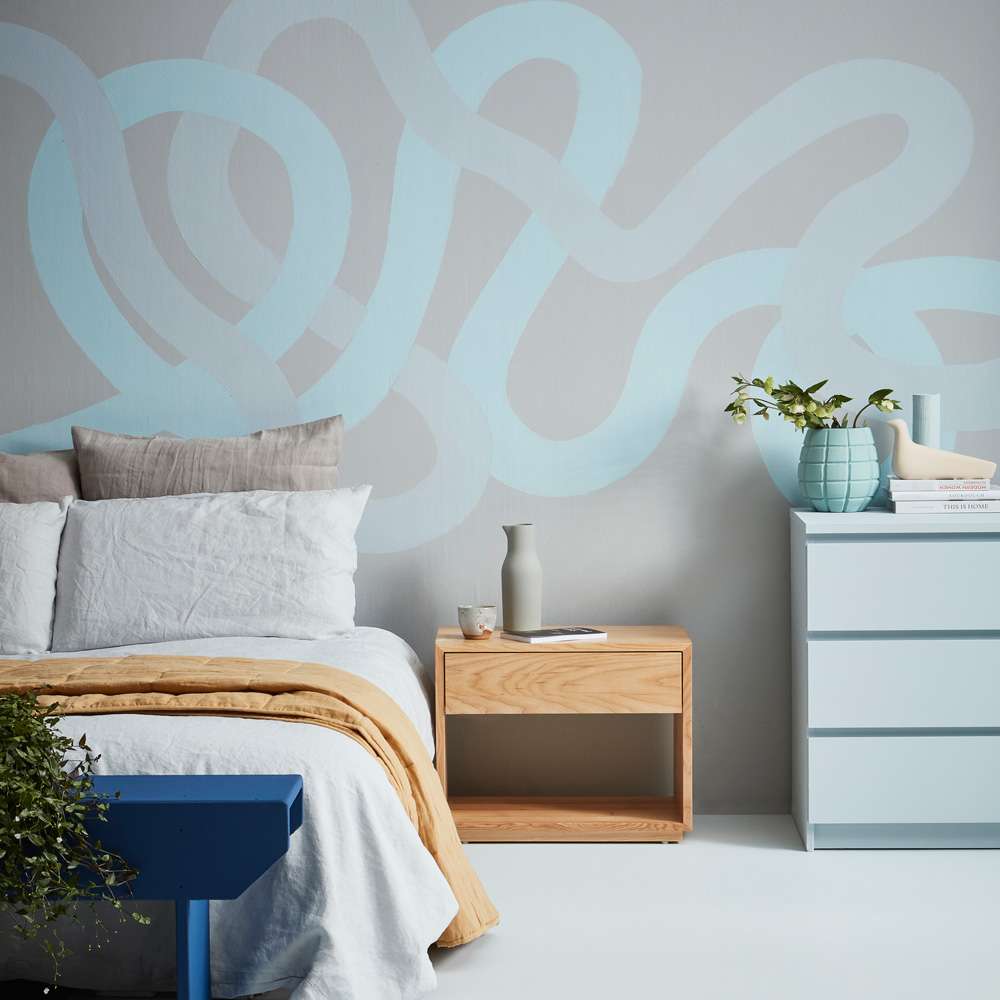
Coastal blues and greys are a natural match for creating a restful and relaxing space, such as in a bedroom or living room. Wall in Resene Grey Seal with painted swirls in Resene Mystery and Resene Remember Me, floor in Resene Quarter Surrender, bench in Resene Bewitched, chest of drawers in Resene Remember Me, slim vase in Resene Slipstream, jug in Resene Grey Area and gridded vase in Resene Unwind. Project by Gem Adams, image by Wendy Fenwick.
Stonewashed blues like Resene Bounty, Resene Smokescreen and Resene Bluff are the perfect foundation for a more classic style of home such as villas and bungalows. “The muted, dustier blues are much easier to live with than bright, vibrant blues,” explains Megan. “These classical tones work best with timber flooring and with the many greys – such as Resene Double Black White, Resene Hint Of Grey and Resene Mountain Mist – that have been so popular during recent years.”
Blues of any description pair easily with Resene’s vast collection of greens. From the yellow- based lime greens like Resene Hypnotic to the muddy, dark black greens like Resene Blue Bark – the trick is using two colours that are not of equal depth. For those that want to create a more eclectic, contrasting colour scheme – say, pairing with blue and orange (which are opposites on the colour wheel) – then the exact same rules apply. For example, pair a light blue like Resene Cut Glass with a dark orange such as Resene Kamikaze; or a dark inky blue like Resene Dark Night with a pale, washed-out terracotta such as Resene Beethoven for balance.
Blue hues are traditionally thought of as calming, conservative, restful, and dependable and a reassuring colour to have inside our homes.
Visit your local Resene ColorShop to find the best blue for your project or use the blue filter on www.habitatbyresene.co.nz to view blue projects by other homeowners.
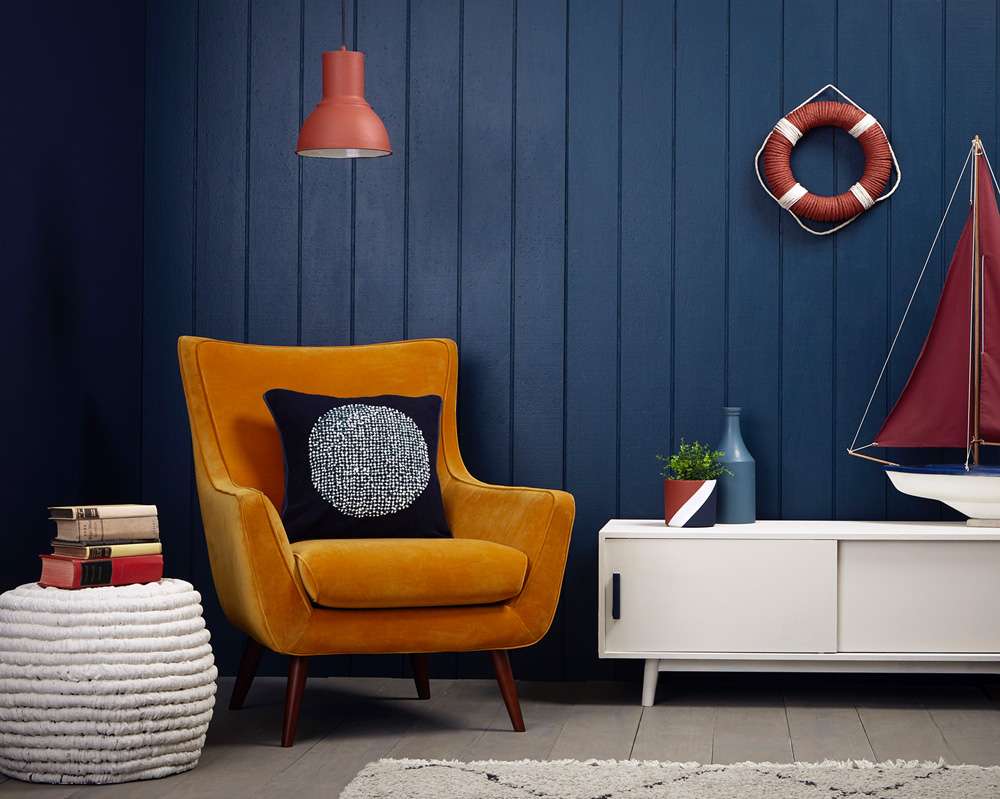
Got a boat lover in the family? Tongue-and-groove panel walls in rich Resene Tangaroa make a beautiful base for a nautical-inspired look. Timber floorboards in Resene Colorwood Mid Greywash, side table and sideboard in Resene Parchment (with handle in Resene Indian Ink), pendant lamp and DIY life preserver wreath in Resene Raging Bull, striped ‘nautical’ plant pot in Resene Raging Bull, Resene Alabaster and Resene Indian Ink and bottle vase in Resene Explorer. Project by Laura Lynn Johnston, image by Bryce Carleton.










